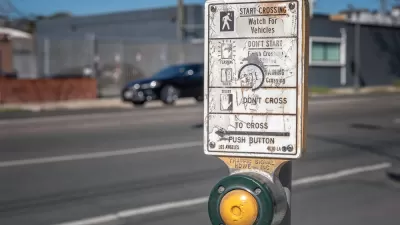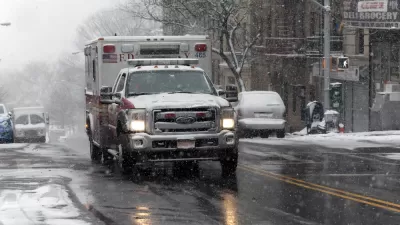A new study that compares how each of the 50 states regulates dangerous motorist behaviors has found that those with the toughest laws have the least traffic deaths. So why don't more states adopt “evidence-based policies”?
"According to a new paper published in the journal Public Health, the states with the toughest driving laws saw an average 14.5 percent decrease in traffic fatalities compared to those with the most relaxed regulations," reports Sarah Goodyear.
Why would some states choose not to adopt policies that have been shown to reduce fatalities? Arguments based on civil liberty grounds my be one reason.
"Strict regulations on texting, or blood alcohol content, or graduated licenses, are sometimes opposed as intrusions on personal freedom," writes Goodyear. "But Silver says that 'nanny state' arguments commonly leveled against some other public health regulations don’t really make sense when applied to driving laws."
“People driving hit other people,” she says. “They are, in turn, hit by others. They have other people in those cars who don’t always have a choice to be there. That seems slightly different than arguing over the size of soda cups. Getting it wrong means that there are such egregious consequences. There are fatalities.”
FULL STORY: Across the 50 States, a Big Disparity in Road Safety

Alabama: Trump Terminates Settlements for Black Communities Harmed By Raw Sewage
Trump deemed the landmark civil rights agreement “illegal DEI and environmental justice policy.”

Planetizen Federal Action Tracker
A weekly monitor of how Trump’s orders and actions are impacting planners and planning in America.

The 120 Year Old Tiny Home Villages That Sheltered San Francisco’s Earthquake Refugees
More than a century ago, San Francisco mobilized to house thousands of residents displaced by the 1906 earthquake. Could their strategy offer a model for the present?

Opinion: California’s SB 79 Would Improve Housing Affordability and Transit Access
A proposed bill would legalize transit-oriented development statewide.

Record Temperatures Prompt Push for Environmental Justice Bills
Nevada legislators are proposing laws that would mandate heat mitigation measures to protect residents from the impacts of extreme heat.

Downtown Pittsburgh Set to Gain 1,300 New Housing Units
Pittsburgh’s office buildings, many of which date back to the early 20th century, are prime candidates for conversion to housing.
Urban Design for Planners 1: Software Tools
This six-course series explores essential urban design concepts using open source software and equips planners with the tools they need to participate fully in the urban design process.
Planning for Universal Design
Learn the tools for implementing Universal Design in planning regulations.
Clanton & Associates, Inc.
Jessamine County Fiscal Court
Institute for Housing and Urban Development Studies (IHS)
City of Grandview
Harvard GSD Executive Education
Toledo-Lucas County Plan Commissions
Salt Lake City
NYU Wagner Graduate School of Public Service





























